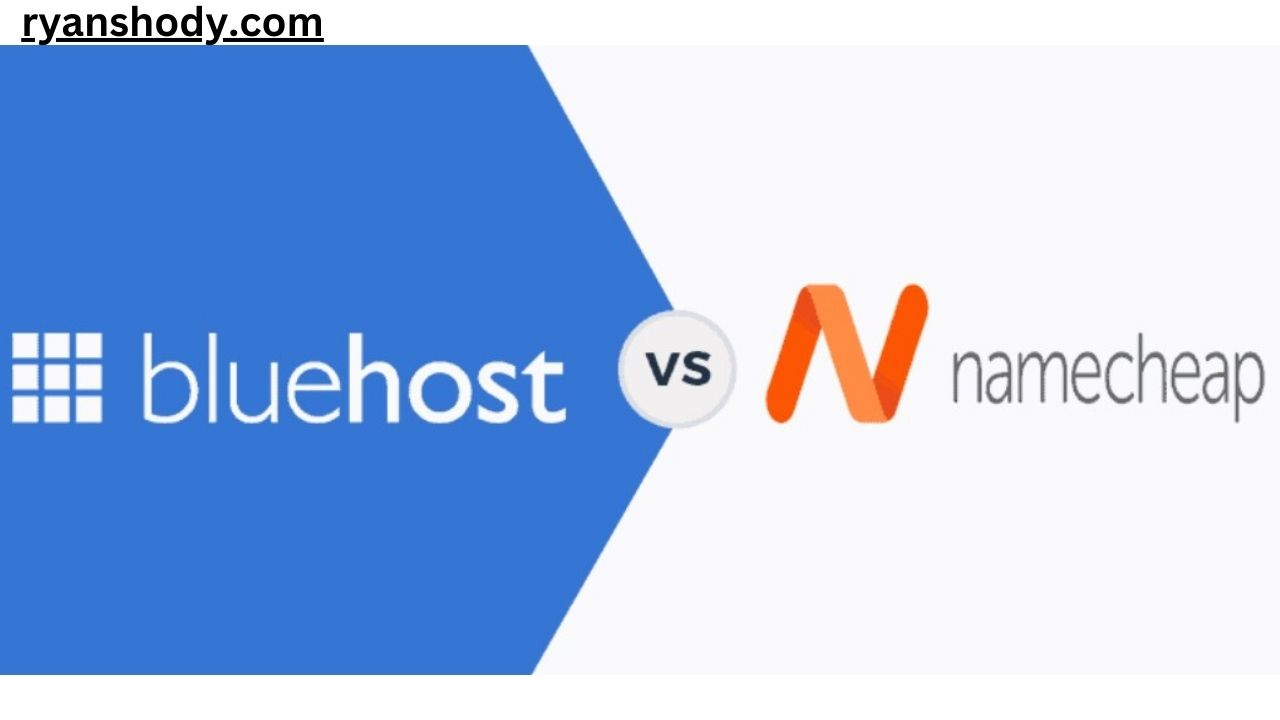When it comes to choosing a web hosting provider, the Bluehost vs Namecheap comparison is a critical decision for many. This guide dives deep into a web hosting comparison between these two industry leaders, offering insights for bloggers, business owners, and webmasters.
Understanding the unique offerings of Bluehost and Namecheap can significantly impact the success and performance of your online venture.

Bluehost has long been recognized for its reliability and extensive support, making it a preferred choice for those looking to choose the best web hosting. Its user-friendly interface and strong integration with WordPress cater to a wide range of users.
On the other hand, Namecheap is known for its cost-effectiveness, offering some of the best hosting deals without sacrificing essential features, appealing to budget-conscious site owners.
Our comprehensive guide will cover various aspects such as performance, pricing, user experience, and customer service. We aim to provide a clear and detailed perspective on Bluehost vs Namecheap, enabling you to make an informed decision tailored to your specific hosting requirements.

By breaking down the strengths and weaknesses of each provider, this guide helps align your hosting choice with your website’s goals, ensuring your decision is well-informed and beneficial for your digital presence.
In the bustling domain of web hosting, the Bluehost vs Namecheap comparison stands out as a crucial decision for many website owners.
Both Bluehost and Namecheap offer unique benefits and features, catering to diverse web hosting needs. To help you navigate this choice, we’ve prepared a concise yet informative comparison.
Bluehost has established itself as a reliable and user-friendly option, especially favored by WordPress users. It offers a range of features from high performance to excellent customer support.

Namecheap, on the other hand, is renowned for its affordability and straightforward services, making it a preferred choice for those seeking budget-friendly hosting solutions.
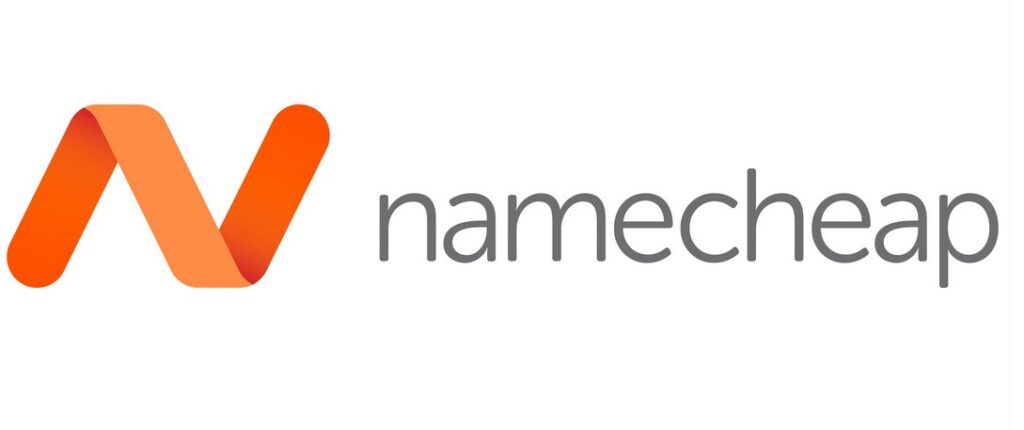
Comparison Table (Bluehost vs Namecheap)
| Feature | Bluehost | Namecheap |
|---|---|---|
| 1. Pricing | Competitive, with various plans | Highly affordable |
| 2. Uptime | Excellent uptime | Good uptime |
| 3. Speed | Fast loading times | Decent speed |
| 4. Customer Support | 24/7 support | 24/7 support |
| 5. User Interface | Intuitive and user-friendly | Simple and easy to navigate |
| 6. Security Features | Advanced security options | Basic security features |
| 7. WordPress Integration | Seamless integration | Good compatibility |
| 8. Domain Services | Free domain (1st year) | Free domain and privacy protection |
| 9. Email Hosting | Free email accounts | Free email with some plans |
| 10. Money-back Guarantee | 30-day guarantee | 30-day guarantee |
This Bluehost vs Namecheap comparison aims to highlight the primary differences to help you make an informed decision. Each provider has its unique strengths, and the best choice depends on your specific hosting requirements.
Features of (Bluehost vs Namecheap)
When considering web hosting options, the features each provider offers are critical in making an informed choice.
In this section, we delve into a detailed comparison of the features of Bluehost vs Namecheap. Known for its robust and versatile hosting solutions, Bluehost caters to a wide range of users, from beginners to large businesses.
In contrast, Namecheap is acclaimed for its affordability and straightforward services, appealing particularly to those starting out or operating on a tighter budget.
This Bluehost vs Namecheap features comparison is tailored to help you weigh the pros and cons of each, ensuring you choose the service that best fits your web hosting requirements.
Bluehost Features:

- Performance: Known for its high-speed and reliable performance, ideal for both new and established websites.
- User Interface: Offers a user-friendly cPanel, making site management straightforward.
- WordPress Integration: Provides seamless, one-click WordPress installation, enhancing the user experience for WordPress site owners.
- Domain Registration: Includes a free domain for the first year, reducing initial costs.
- Email Accounts: Offers free email hosting, a necessary feature for professional communication.
- Security Measures: Equipped with advanced security options to protect websites.
- Customer Support: Delivers 24/7 expert assistance, ensuring help is always available.
Namecheap Features:
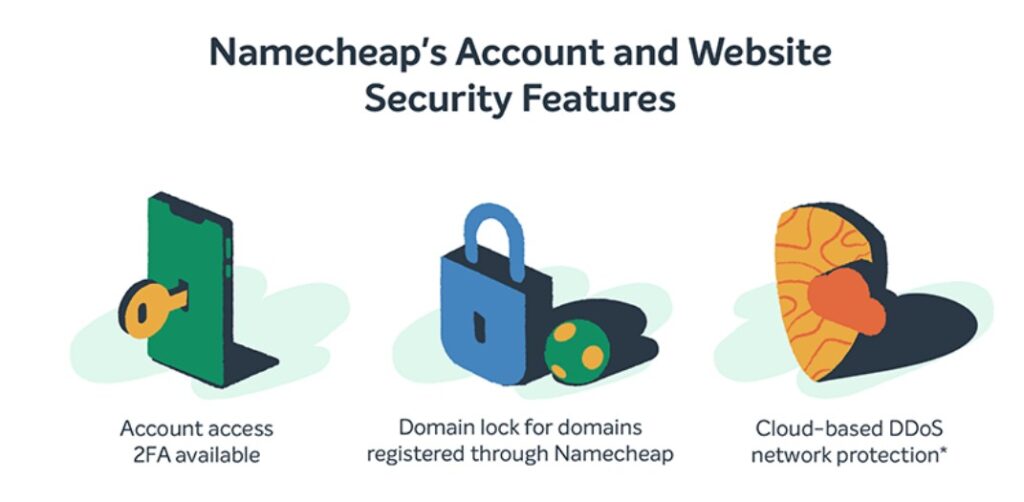
- Affordability: Highly competitive pricing, making it an excellent choice for budget-conscious users.
- Ease of Use: Features a simple and intuitive dashboard for easy website management.
- WordPress Compatibility: Ensures easy setup and efficient operation with WordPress.
- Domain Services: Provides a free domain and privacy protection, adding value.
- Email Solutions: Offers free email with certain hosting plans.
- Security: Standard security features with options for enhancement.
- Uptime Guarantee: Promises 99.9% uptime, ensuring website availability.
By comparing Bluehost vs Namecheap, it’s clear that both providers have their strengths. Bluehost excels in performance and user experience, while Namecheap stands out for its affordability and user-friendly approach.
Personal Experience with (Bluehost vs Namecheap)

Navigating through the world of web hosting, my experience with Bluehost and Namecheap offered distinct perspectives, each with its own set of strengths, particularly when considering the Best Hosting for Small Businesses.

Bluehost stood out with its impressive reliability; essential for Secure Web Hosting Options. The customer support was notably efficient, responding promptly and knowledgeably to any queries I had. One of the highlights was the seamless WordPress integration, which simplified the process of setting up and managing my blog, a key aspect in Website Builder Reviews.
Additionally, Bluehost’s features like free email hosting and advanced security options provided value, especially in the realm of E-commerce Hosting Solutions.
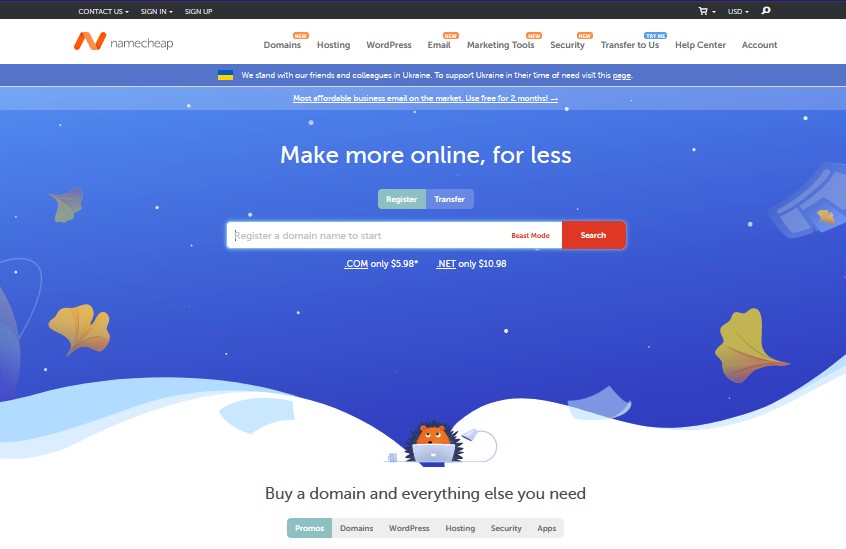
On the other hand, Namecheap appealed primarily due to its cost-effectiveness. The plans were affordably priced, making it an attractive option for Domain Registration and Management. The user-friendly interface facilitated hassle-free site setup.
While Namecheap’s customer support was competent, it didn’t match the promptness of Bluehost’s service, a consideration for businesses looking for reliable Best Hosting for Small Businesses.
In comparing Bluehost vs Namecheap, it’s clear that each has its unique advantages: Bluehost shines in performance and user support, while Namecheap is ideal for those seeking affordability and simplicity, particularly in the context of E-commerce Hosting Solutions.
Pricing and Plans (Bluehost vs Namecheap)
When considering a web hosting provider, pricing and plans are often the deciding factors. In this comparison of Bluehost vs Namecheap, we’ll explore the different pricing structures and plans offered by each, to give you a clearer picture of what you can expect in terms of cost and value.
Bluehost offers a range of pricing plans, each designed to meet different needs and budgets. From basic shared hosting to more advanced options like VPS and dedicated hosting, Bluehost’s plans cater to a variety of users.
Namecheap, on the other hand, is renowned for its affordability. It provides an array of budget-friendly plans, making it an attractive option for those just starting out or operating on a tight budget.
Comparison Table of Pricing and Plans:
| Plan Type | Bluehost Price | Namecheap Price |
|---|---|---|
| Basic Shared Hosting | $2.95 – $7.99/month | $1.58 – $4.48/month |
| WordPress Hosting | $2.95 – $5.45/month | $3.88 – $11.88/month |
| VPS Hosting | $18.99 – $59.99/month | $11.88 – $19.88/month |
| Dedicated Hosting | $79.99 – $119.99/month | Not offered |
| Reseller Hosting | Not offered | $18.88 – $48.88/month |
| Domain Registration | From $11.99/year | From $8.88/year |
| Email Hosting | Free with hosting plan | Free with hosting plan |
Both Bluehost vs Namecheap offer competitive pricing in their respective domains. While Bluehost provides more comprehensive services, particularly for businesses looking for advanced hosting solutions, Namecheap stands out for its cost-effective plans, especially for individuals and small-scale users.
Pros & Cons of Bluehost vs Namecheap
Understanding the advantages and disadvantages of web hosting services is crucial for making an informed decision.
In this section, we’ll delve into the pros and cons of Bluehost vs Namecheap.
Each service has its unique strengths and weaknesses, and comparing them can help you determine which one aligns best with your hosting needs.
Pros of Bluehost:
- Reliable Performance: Known for consistent uptime and fast loading speeds.
- User-Friendly: Offers an intuitive cPanel, making it easy for beginners.
- WordPress Integration: Excellent for WordPress sites with one-click installations.
- Customer Support: Provides robust 24/7 support.
- Security Features: Includes advanced security options.
- Free Domain: Offers a free domain name for the first year.
- Email Hosting: Free email accounts included with hosting plans.
Cons of Bluehost:
- Higher Renewal Rates: Prices increase after the initial term.
- Upselling Tactics: Frequent upselling of addons and services.
- Limited Cheaper Plan Features: Basic plan has limited features compared to higher plans.
Pros of Namecheap:
- Affordable Pricing: Offers some of the most competitive prices in the market.
- Free Domain and Privacy: Includes domain name and privacy protection.
- Simple User Interface: Easy-to-navigate dashboard and cPanel.
- Good Uptime: Reliable uptime for most websites.
- 30-Day Money-Back Guarantee: Offers a 30-day refund policy.
- Decent Customer Support: Provides 24/7 customer support.
- Free Email Hosting: Includes free email services with hosting plans.
Cons of Namecheap:
- Performance Variability: Sometimes experiences fluctuations in speed.
- Limited Advanced Options: Fewer features for advanced or high-traffic sites.
- Backups: Backup options are more limited compared to Bluehost.
When comparing Bluehost vs Namecheap, it’s evident that Bluehost excels in performance and features, making it ideal for those seeking robust hosting solutions.
Namecheap, however, stands out for its affordability and simplicity, appealing to users who are budget-conscious or new to website hosting.
Alternatives to Bluehost vs Namecheap
In the dynamic web hosting market, considering alternatives to popular services like Bluehost and Namecheap is crucial for making a well-informed decision.
For those exploring website hosting solutions, it’s important to review different options that might better align with their specific hosting needs.
This section will explore noteworthy alternatives to both Bluehost and Namecheap, assessing how they stack up in terms of hosting performance, customer service, and hosting packages.
Alternatives to Bluehost:

- SiteGround: Known for outstanding customer support and high-performance hosting.
- HostGator: Offers a range of flexible plans with excellent scalability options.
- DreamHost: Commended for its data privacy and security measures.
- A2 Hosting: Stands out for its fast website loading speeds and reliability.
- WPEngine: A top choice for managed WordPress hosting services.
- InMotion Hosting: Offers comprehensive VPS and dedicated hosting solutions.
- GreenGeeks: A unique eco-friendly hosting option with consistent performance.
Alternatives to Namecheap:

- Hostinger: Highly affordable hosting with decent performance.
- GoDaddy: Offers a broad domain management service, including hosting and website builders.
- iPage: Known for its budget-friendly shared hosting plans.
- Bluehost: A versatile option balancing features and cost.
- SiteGround: Distinguished by its exemplary customer support and uptime.
- DreamHost: Focuses on user-friendliness and privacy.
- HostPapa: Tailored towards small businesses with personalized support.
Exploring these alternatives to Bluehost and Namecheap offers insights into a range of web hosting options, each with unique selling points. Whether you prioritize advanced features, specialized hosting types, or budget considerations, there’s a service out there to fulfill your web hosting requirements.
Other Relevant Categories in Comparison(Bluehost vs Namecheap)
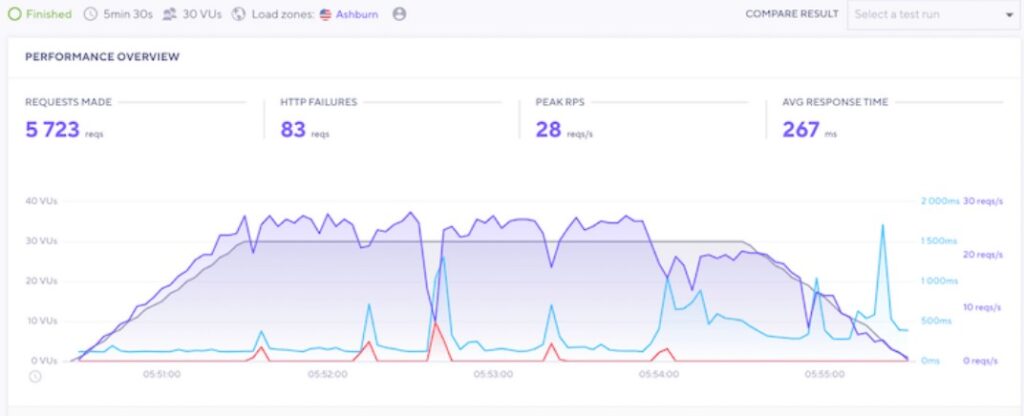
When comparing Bluehost vs Namecheap, it’s also important to consider various other categories that are crucial in the decision-making process, such as eCommerce capabilities, website scalability, and additional services like email hosting and site migration.
Categories for Bluehost:
- Scalability: Well-suited for business expansion needs.
- eCommerce Features: Strong WooCommerce hosting capabilities.
- Shared Hosting: Great for beginner websites.
- VPS Hosting: Offers flexible and scalable solutions.
- Additional Services: Includes various digital marketing tools.
- Performance: Known for consistent uptime and speed.
- WordPress Optimization: Offers enhanced WordPress features.
Categories for Namecheap:
- Budget-Friendly Plans: Ideal for cost-conscious users.
- Ease of Use: Simple interface for beginners.
- Domain Services: Extensive domain registration and management options.
- Security: Provides basic but effective security solutions.
- Customer Support: Good, albeit less extensive than Bluehost.
- Performance: Adequate for small to medium-sized websites.
- Email Hosting: Includes complimentary email services.
Conclusion/Summary: Who is the Winner?
After a comprehensive comparison, Bluehost emerges as the winner with a rating of . It excels in performance, WordPress integration, and customer support, making it ideal for businesses and professional websites.
Namecheap also performs well with a rating of , offering affordability and ease of use, suitable for individuals and small-scale projects.
Winner: Bluehost
FAQ (Bluehost vs Namecheap)
FAQ 1: What are the main differences between Bluehost and Namecheap?
Answer: The main differences lie in their pricing, performance, and target audience. Bluehost tends to offer more robust performance and better WordPress integration, making it ideal for businesses and professional websites. Namecheap, on the other hand, is more budget-friendly and offers a simpler user interface, appealing to individuals and small-scale projects.
FAQ 2: Can I transfer my existing website from Namecheap to Bluehost, or vice versa?
Answer: Yes, both Bluehost and Namecheap support website transfers. Bluehost offers a migration service for WordPress websites, and Namecheap provides guidance for transferring your site to their hosting. However, it’s important to check the specifics and possible costs associated with each service.
FAQ 3: Which hosting service is better for eCommerce websites?
Answer: For eCommerce websites, Bluehost might be a better choice, particularly because of its dedicated WooCommerce hosting plans and better performance capabilities. These features are essential for running a smooth and reliable online store.
FAQ 4: How do Bluehost and Namecheap compare in terms of customer support?
Answer: Bluehost generally receives higher ratings for customer support, offering 24/7 assistance through phone, chat, and email. Namecheap also provides 24/7 support but primarily through chat and email, and some users report longer response times compared to Bluehost.
FAQ 5: Are there any significant differences in security features between Bluehost and Namecheap?
Answer: Yes, there are differences. Bluehost offers more advanced security features like SiteLock, which includes malware detection and removal. Namecheap also provides necessary security features, including domain privacy and SSL certificates, but its offerings might be more basic compared to Bluehost.

